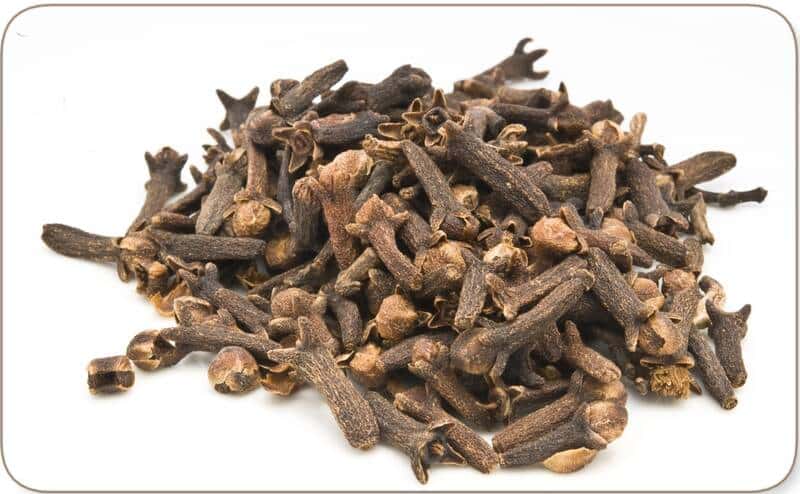How to use clove for cough and cold? Is Clove Good for Cough and Cold? How does it work? How to Make Clove Tea for Cough and Cold? Is Clove Good for Throat Infection? Can it be mixed with vegetable oil or ointment? Is clove dangerous? Is Clove Harmful to Lungs and Liver? How much clove per day? And finally, what are the other grandmother’s remedies for all types of cough?
I- Brief Review of the Types of Cough
# Dry Cough
When a cough is not productive, more precisely in the absence of mucus expectoration, it is said to be dry.
Very often, it is exhausting insofar as the patient cannot be relieved by clearing his bronchi.
Acute, it is frequently linked to an irritant cause, sometimes ENT (rhinitis, sinusitis, angina), pleurisy, acute pulmonary edema, the presence of an inhaled foreign body, especially in children.
Chronic, it is linked to interstitial lung disease, sarcoidosis, gastroesophageal reflux, bronchial or ENT cancer, medication (certain antihypertensive drugs), asthma (often nocturnal or during exercise), whooping cough.
It should be noted that an initially dry cough can sometimes turn into a wet cough.
# Fatty Cough
A wet cough, unlike a dry cough, is productive in the sense that it is followed by expectoration of mucus.
This allows the bronchial tubes to be cleared to relieve the patient.
Acute, it is generally caused by a pulmonary or bronchial infection (pneumopathy, bronchitis, tuberculosis). Similarly, sinusitis can cause a wet cough, by the descent of secretions into the bronchi.
It is linked to chronic bronchitis, dilatation of the bronchi, cystic fibrosis, COPD if it is chronic.
II- How to Use Clove for Cough and Cold?
1. Is Clove Good for Cough and Cold?
The virtues of dried clove are countless. It is, indeed, recognized as a very powerful antibacterial.
This allows it to clean the respiratory system badly affected by coughing, whether dry or oily. As an illustration, with the help of the essential oil of Clove, you will restore the healthy immune defenses necessary for the protection of bronchioles.
Similarly, the excellent antiseptic and anesthetic power of eugenol, its active ingredient, will act as a sedative, very appropriate during episodes of coughing fits when you feel that your chest is on fire.
Similarly, the clove has an anti-inflammatory property. And thus, it allows resorption of the phenomenon of inflammation of the respiratory system.
Moreover, it has a curative action that will attack the cough itself. This action allows it to trigger an improvement in the tone and immune defenses internally.
2. How to Make Clove Tea for Cough and Cold?
You can use clove in different ways.
For example, you have the option of making a remedy based on the following ingredients: 1 teaspoon of cloves (4 g), 1 cup of water (250 ml), 1 ginger root, 3 whole black peppercorns, and the juice of a lemon.
As for the preparation, you must first crush the peppercorns well. Then, you have to boil, in a saucepan, the clove and the ginger with the equivalent of a cup of water. Leave on the fire for a few minutes.
Finally, you are advised to add black pepper to the mixture.
Take care to extinguish the fire and add the juice of a lemon to finish.
You should consume this preparation once or twice a day until the cough disappears.
Similarly, you use the essential oil of Clove for internal use. In a spoon of honey or on a tablet, 2 drops of essential oil of Clove and let it dissolve in the mouth.
You must repeat this action 3 times a day for 5 days.

3. Clove and Honey for Cough and Cold
Similarly, you can make an infusion of clove. First, you need to have 3 to 8 cloves in a cup.
Then, pour boiling water over it. Let it infuse for 10 minutes. Finally, remove the cloves and add a spoonful of liquid honey or a pinch of cinnamon to sweeten the preparation.
These different natural ways of using the above-mentioned clove will help you to fight effectively against cough.
4. Clove in ointment
For external use, it is recommended that you dilute the essential oil of clove in a large proportion.
Specifically, you need to dilute 2 drops of Clove essential oil in 10 drops of vegetable oil (such as hazelnut oil) and massage the chest gently.
After application, rinse your hands well. Repeat 3 times a day for a maximum of 5 days.
5. Cloves for Phlegm
When you have a runny nose, the excess mucus it produces usually falls down your throat, and sometimes a lot of it gets stuck in your throat and bronchi.
Coughing is known to be the body’s proper response to get rid of this phlegm that clings everywhere.
It is a natural reflex to clear the airways of these secretions such as mucus.
Cloves have the ability, due to their antibacterial and anti-inflammatory properties, to dry out the nose and prevent it from running again.
This natural antiseptic and analgesic provide an effective solution, cleaning the throat and nose of the various infections that create mucus.
Here is the infusion that we recommend against phlegm and runny nose:
Take a clove or two cloves, a teaspoon of grated ginger, a pinch of cinnamon, and put it in a glass of hot water.
Leave to infuse for a few minutes, add a teaspoon of organic honey to soften the taste of the ingredients.
Drink this tea hot before going to sleep.
6. Is Clove Good for Throat Infection?
As we have just seen for the mucus, cloves by their antibacterial properties are excellent to fight against the various infections of the throat.
You can the same tea that we have just seen previously.
7. How to Take Clove Oil Internally?
Clove oil is very strong and is generally not recommended for internal use.
Drinking a few drops of this oil can cause you quite unpleasant digestive problems.
It is best to avoid swallowing it.
The best known internal use is for the treatment of gum problems, toothaches, and disinfection of the upper throat.
Even for this use, put a drop of this oil in a few spoonfuls of water and gargle with it, before spitting it out. It has the effect of soothing mouth and throat aches.
8. Can Cloves Help Tonsillitis?
Tonsillitis is a blockage between the larynx and the mouth, where slime builds up and prevents the cells from working and the sick child has epidermal reactions.
Tonsillitis is a disease that mainly affects young children.
An African doctor says that putting 7 cloves in a liter of hot water and letting it steep for half an hour, can be a very good solution to cure this disease quickly.
9. Cloves for Cough in Babies
As we have seen throughout this article, cloves are an excellent natural ingredient for relieving sore throats and mucus that is left behind.
Cloves mixed with honey is an ancient Indian recipe for relieving coughs in babies.
You need to roast some cloves, then grind them very finely. Then mix this clove flour with honey.
You will obtain a kind of light paste of which you will give a small spoonful to your baby before putting him to bed.
Remember that before the age of one, honey is not recommended for babies.
10. Keeping Clove in Mouth while sleeping
It is a bit risky to leave cloves in your mouth while you sleep.
The risk is not that you can ingest them without realizing it because your stomach will have no trouble getting rid of them quickly.
The real risk is that you may end up with a clove stuck in your throat for a while. This can cause some discomfort.
Those who use this method of slapping cloves in the mouth while sleeping, say that it cleanses the body, relieves the mouth and throat, and thoroughly cleans all parts of the digestive system of small infections and bacteria, from the teeth and gums to the colon.
III- Is Clove Harmful to Lungs and Liver?
You must use clove with great care even though it has been used for hundreds of years in cooking.
Clove is toxic for the liver and lungs in overdose. Its herbal teas, although much less concentrated than the essential oil, should not be used over a long period or regularly.
In case of cough, it is advisable to take 2 to 3 cups per day for one-week maximum.
IV- Can Clove Cause Sore Throat
The answer is simply no.
On the contrary, cloves are just the thing to relieve a sore throat.
Simply put two cloves in your mouth and leave them there to moisten and release their juice to clean the throat of any infections that have settled.
V- Potential Side Effects of Cloves
It is important to know that cloves are quite strong spices and are not without risk.
The essential oil of clove, for example, can sometimes be toxic if we are not too careful in its use.
It can cause vomiting, nausea, and burning sensations when used improperly.
Clove is not recommended for pregnant or nursing women or children under 12 years of age.
Some people are allergic to clove and its oil.
That’s why, when we want to try it for the first time, we must use a small quantity to see the reaction of our organism.
In the case of cutaneous use, we can try it on a small part of our body (the inside of the elbow) and wait 24 hours to see if we do not make a reaction to this spice.
In any case, it is always better to consult your doctor before using cloves for medicinal purposes.
IV- How Many Cloves Can You Eat Per day? [Chewing Clove for Cough]
You need to chew three or four cloves a day if you want to benefit from the advantages of cloves. This dosage allows relieving the pains due to the cough.
Remember that cloves are very good aphrodisiacs. So be careful not to overdo it if you are single.

V- Other Home Remedies Against all Types of Coughs and Colds
# Lemon and Honey for Cough and Cold
Lemon associated with honey allows you to fight naturally against cough. You need to heat a cup of hot water and pour in the juice of a lemon.
Do not forget to add a teaspoon of honey and a few cloves. It is then recommended to let it steep for 10 minutes. Strain and drink.
# Baking Soda for Cough and Cold
Baking soda can also help you fight coughs. Practice a gargle of several minutes, repeat several times a day, preferably in the evening at bedtime.
However, you should not exceed 2 to 3 uses per week and do not swallow it. Note that bicarbonate is not a medicine.
# Coarse Salt and Hot Water for Cough and Cold
Coarse salt helps to cure coughs. It is recommended that you incorporate a little salt (between ¼ and ½ teaspoon) in one to two cups of water, and then gargle with this mixture.
Be careful, not to be heavy-handed with the salt, since a preparation that is too salty could have the opposite effect and irritate your throat.
Useful Links:
Clove (Syzygium aromaticum): a precious spice
Clove is a plant grown in parts of Asia and South America
The chemical and pharmacological basis of cloves (Syzygium aromaticum (L.)